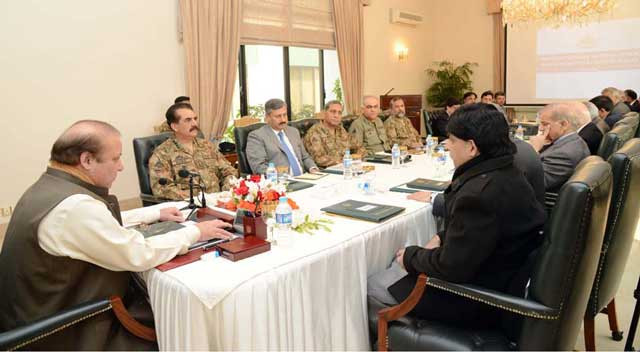Govt to act against sectarian terrorists
Civil, military leaders discuss ways to stem tide of violence

PM Nawaz Sharif chairing a high-level meeting to review the prevailing security situation at PM House on January 13, 2016. PHOTO: PID
The conclave decided to expand the scope of all provincial apex committees, especially of Balochistan’s, and to expedite establishment of a central record office to arrest terrorists and dismantle criminal networks. The apex committees have been set up under the National Action Plan to synergise efforts in the fight against terrorism and violent extremism.
Though the overall security situation has seen marked improvement, sectarian terrorism and religious extremism pose new challenges to security agencies. The nexus between sectarian extremists and criminal networks has to be broken to reverse the tide of violence.
Prime Minister Nawaz Sharif chaired two meetings – one in the federal capital and the other in Quetta. Attendees included army chief General Raheel Sharif, Balochistan Governor Muhammad Khan Achakzai, Chief Minister Sanaullah Zehri, Interior Minister Chaudhry Nisar Ali Khan, ISI chief Lt Gen Rizwan Akhtar, Commander Southern Command Lt Gen Aamir Riaz, and other senior civilian and military officials.
Participants were informed that the police centre attackers had come from Afghanistan and had been in contact with their handlers in Afghanistan throughout the hours-long assault. The recording of the intercepted communication between the terrorists and their handlers were played in the meeting.
According to sources, Premier Nawaz voiced concern over the matter and said it would be formally taken up with Afghan officials. Islamabad has repeatedly asked Kabul to act against the sanctuaries of Pakistani terrorists on its soil.
Initial investigation points to involvement of the Lashkar-e-Jhangvi sectarian extremist group in Monday’s Quetta police training centre assault, sources told The Express Tribune. And this is what IGFC Maj Gen Sher Afgun told the media.
The meetings decided to implement NAP in letter and spirit. “The LeJ carried out the attack. Such groups would not be allowed to live, with the implementation of NAP in letter and spirit,” Balochistan government spokesman Anwarul Haq Kakar told The Express Tribune. “This was the unanimous resolve of all stakeholders.”
Premier Sharif took notice of a delay in implementation of the Quetta Safe city plan and said the federal government was ready to provide funds, if that was the reason.
According to sources, investigators would also look into possible role of Indian spy agency, the Research and Analysis Wing (RAW), which has been fuelling terrorism in Balochistan in its attempt to sabotage the CPEC.
“The LeJ is an anti-Shia group which, in the past, only targeted the Shia community, mainly Hazaras in Balochistan. After its command and control centres have been destroyed in Balochistan, Punjab and elsewhere, it is now hitting targets anywhere with the support of hostile agencies, including RAW and Afghanistan’s National Directorate of Security,” one source said.
Before leaving for Quetta, Premier Sharif was briefed about the security situation in Balochistan by National Security Adviser Lt Gen (retd) Nasser Janjua, who also accompanied the premier to Quetta along with Interior Minister Nisar.
Janjua is said to have briefed the premier on the urgency to expand the scope of the apex committees across the country, particularly in Balochistan not only to effectively combat terrorism but also to take on criminal gangs run by mafias due to a strong nexus between criminal syndicates and terrorist outfits.
On October 14, Janjua chaired an important meeting of the NAP Implementation Committee in which it was decided to establish a central record office to share information between the Centre and the provinces on terrorists and criminals, particularly those involved in religious or sectarian violence.
The issue, sources said, figured high in Tuesday’s meetings and Premier Sharif gave the go-ahead for speeding up the establishment of the said office.
“Terrorist outfits and criminal syndicates complement each other. This is necessary for their survival. They also receive direct or indirect support from hostile agencies. And we are caught up in a vicious circle of violence,” a government official said requesting anonymity.
Balochistan Home Minister Mir Sarfraz Bugti said the close nexus between terrorist groups and RAW was an open secret. “It’s not even a secret anymore. RAW is using the LeJ and its affiliated outfits to unleash terrorism in Pakistan,” he told The Express Tribune. “The sacrifices of our brave soldiers will not go to waste and these terrorist organisations will be decimated.”
The minister claimed that security and intelligence agencies have found important clues in Monday’s attack. “I cannot share details with you due to operational sensitivities attached to the matter,” he added. “All of us are working day and night to eliminate terrorism. Terrorists are on the verge of extinction and are making desperate attempts for their survival.”
Published in The Express Tribune, October 26th, 2016.



















COMMENTS
Comments are moderated and generally will be posted if they are on-topic and not abusive.
For more information, please see our Comments FAQ